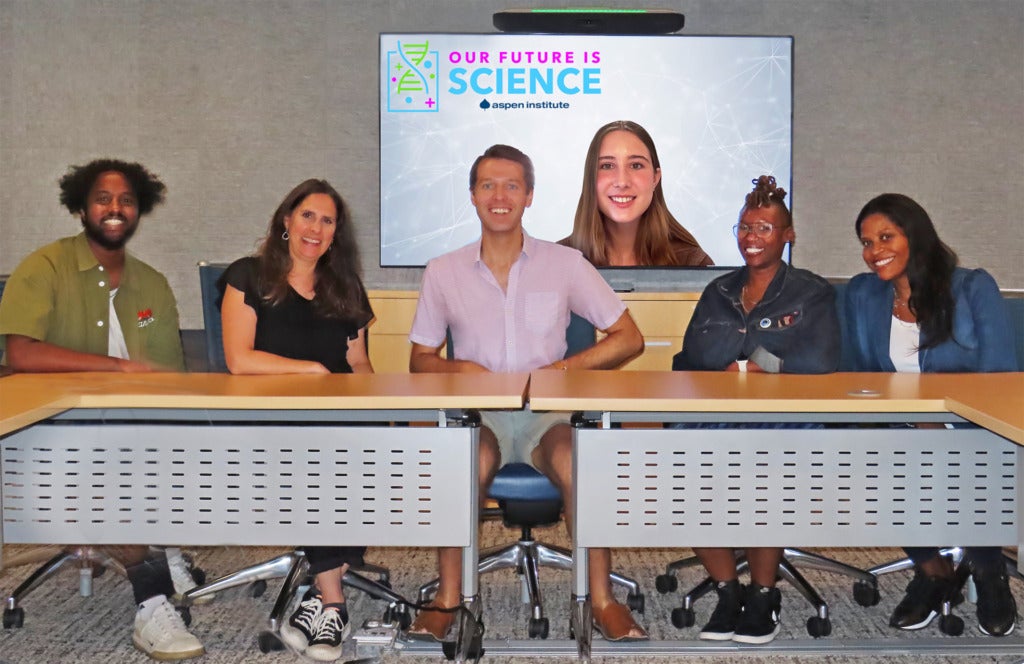The Aspen Institute Science & Society Program’s Our Future Is Science (OFIS) initiative has been selected as one of 21 global Winners in the annual Falling Walls Foundation competition to identify scientific breakthroughs of the year.
Through a competitive process adjudicated by an Advisory Board, OFIS was judged out of 136 applications from 54 countries in the Science Engagement category. The Foundation defines the category as “activities, events, or interactions bridging the gap between science and society to generate mutual learning and benefits across the spectrum of public engagement and interactive science communication” and “a two-way process aimed at shaping and co-creating scientific processes, and promoting active community involvement in scientific knowledge production.” This year’s Science Engagement category has a special focus on climate change and adaptation.
The Winner designation comes with an opportunity to pitch the initiative in person at the Falling Walls Science Summit in Berlin, Germany, on November 7, 2024, in front of a distinguished jury and global audience. The jury will select one Science Breakthrough of the Year in Science Engagement awardee who will present on November 9 alongside the Breakthroughs of the Year in the Emerging Talents and Science Start-ups categories. The Falling Walls Science Summit coincides with the 35th anniversary of the fall of the Berlin Wall.
OFIS’s application to the competition was submitted by Hassan Farah, Ph.D., who served as a Mentor in the inaugural OFIS cohort in 2021–2022 and now serves as Science & Community Project Manager at the Aspen Institute. Farah completed his doctorate at Virginia Tech researching the biomechanics of balance and walking for children with hemiplegia cerebral palsy. Since his time as an undergraduate at the University of Arizona, Farah has developed and directed leadership training programs, organized large-scale demonstrations and negotiations as a student activist, and has always been committed to mentorship within and outside of university settings. He pulls from his experiences to foster stronger relationships between OFIS Mentors, Mentees, and Ambassadors.

The OFIS team gathered in summer 2024 for the initiative’s annual planning retreat. Left to right: Hassan Farah, Caroline Gelb, Aaron Mertz, Alexandra Montgomery, Ebony Tyler, Jylana Sheats / Photo property of the Aspen Institute Science & Society Program.
“I joined the Aspen Institute staff in 2023 after experiencing firsthand the impact that OFIS’s unique STEM curriculum has on young changemakers,” Farah said. “It is an honor to have grown alongside this program, from my role in 2021 as a Mentor in the inaugural cohort, to developing platforms and programs to support OFIS students, and now representing OFIS on the global stage in Berlin.”
Founded in 2021, OFIS is the flagship initiative of the Science & Society Program’s Science & Social Community pillar. The initiative aims to position societally minded youth as leaders and innovators who will push science forward in the 21st century. Through a competitive application process, OFIS identifies high-school Mentees and STEM-graduate-student Mentors across the United States to embark on an academic-year-long journey exploring how science applies to local communities. In mentorship teams, students develop Capstone Projects centered on evidence-based science solutions to real-world challenges participants have observed in their respective communities. With three past cohorts of participants, OFIS has a robust alumni network of Ambassadors, who stay engaged with OFIS through programming that allows them to expand their ability to think critically about community issues, apply best practices for gathering and synthesizing information, co-create and prototype science-based solutions to community issues, and enhance public speaking and science communication skills.
Science & Society Executive Director Aaron Mertz and Associate Director Jylana Sheats first learned about the Falling Walls Science Summit in 2022 when they were invited participants in the annual Berlin Science Debate, a discussion platform for high-level representatives from science, politics and business. At the Summit, they met Carrie Boyce, Executive Director of RCIScience (Royal Canadian Institute for Science), who won a Special Award for Inclusive Science Engagement in the Falling Walls Engage category for the Science is a Drag show she co-produces. The Science & Society Program and RCIScience went on to co-host a roundtable bringing together international scientists and advocates working to advance LGBTQ+ people in STEM careers. This roundtable led to a published report coinciding with Pride Month 2023.
“Three years after the initiative was founded, I’m thrilled to see OFIS recognized internationally in this way,” Mertz said. “We were named a Finalist in this competition in 2023, and our designation now as a Winner in 2024 gives us an outstanding global platform to share our innovative approach and to build connections with others enacting the most creative science engagement projects around the world.”
For news media: To request an interview on this award with Aaron Mertz, Executive Director of the Science & Society Program, please contact Communications Coordinator Sejal Goud: sejal.goud@aspeninstitute.org. View the press release online here.

